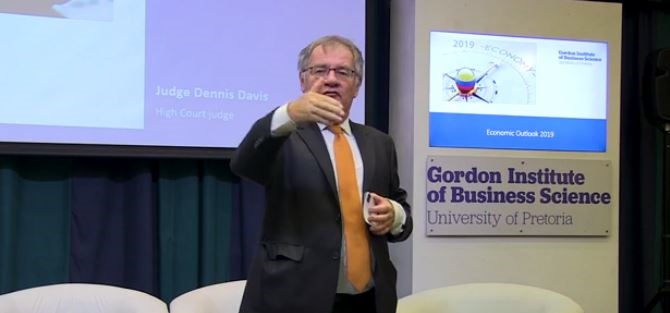
South Africa’s tax system has the unenviable task of striking a fine balance between providing for those who are presently disadvantaged, while being as conducive to economic growth as possible in a highly unequal society.
“If we could grow the economy at 5%, a tax committee would be irrelevant,” High Court Judge Dennis Davis told the Gibs Economic Outlook Conference.
Davis, who was chair of the Davis Tax Committee to assess South Africa’s tax policy framework, said the projected GDP growth rate of 1.5% for 2019 and 2.1% for 2020 was “quite pathetic. Our GDP is tepid, and it puts pressure on revenue.”
While the revised gross tax revenue collection for 2018/2019 of R1.3 trillion would fall short of the government’s expenditure needs, interest costs of R202 billion, or 11% of the total budget to service debt is “a fantastic figure”, Davis said.
South Africa’s very narrow base of individual taxpayers and “a radical decline in corporate tax, which is reflective of the decline in economic activity”, meant South Africa was tax constrained.
“The corporate tax rate puts us outside of the range of competitiveness, with no real room to increase. No wonder our minister of finance cannot find any money.”
Fiscal diagnosis
The reasons behind the dip in South Africa’s tax revenue could partly be explained by the inefficiency of the South African Revenue Service, a decline in tax morality and the impact of the Laffer Curve on collection rates.
“The extent of degradation at Sars is extraordinary,” Davis said.
There was no audit or investigative capacity left at the institution, which had come in “radically under budget on collection in the past five years. If we had collected what we budgeted for, we would have been in a much better position.”
He was encouraged by the imminent appointment of a new Sars commissioner but, Davis said, the revenue service would also need to get an entirely new executive committee: “The corrupt people are still in the system; they are in the long grass and are hard to eradicate.”
It will require serious leadership, he said.
“We will have to recapacitate Sars in the next 12 months. All agencies have to work in coordination, including the Financial Intelligence Centre, Sars and the National Prosecuting Authority, or we will have a serious haemorrhaging of tax.”
Davis added that only when South Africa started seeing some serious prosecutions would he believe that the country had turned the corner.
However, this would have to happen within the next six to nine months.
The second possible reason for under collection of tax revenue was a decline in tax morality, Davis explained.
“We are simply not getting the level of collection that we did previously due to non-compliance. Tax morality has been allowed to collapse.”
The Laffer Curve effect could also be partly responsible for the drop in tax revenue. When tax rates are pushed up too high, people will avoid paying.
Although Davis said he did not believe this to be the case, tax rates had increased for the past five years, while collection had declined each year.
Reconfiguring the tax system
Davis suggested the following four interventions to reconfigure South Africa’s tax system:
• Lower corporate tax to 25% immediately. “This would be an important invitation to show that we are serious about investing in South Africa.”
• Raise the maximum marginal rates of tax: “There is economic evidence to suggest that income tax rates are set to go up globally for very wealthy people,” Davis explained.
He proposed that the proceeds from a 2% increase in personal tax could be ring-fenced for an infrastructure focused sovereign wealth fund, because people would willingly pay this increased rate if they knew the money would be efficiently used for development.
• An additional 1% increase in VAT, with the reassurance of its efficient redistribution.
• A reconfiguration of estate duty, or implementation of a very low wealth tax. “We can’t get away without it in our country and the startling levels of inequality we have,” Davis said.
In conclusion, Davis lamented what he called the “poverty of economic discourse in South Africa. The attitude is either to let the market do everything, or let the state do everything. It is hopeless. You very rarely get a sense that we are getting economic policy which is congruent with our Constitutional values of equality, dignity and freedom for all.”




 Publications
Publications
 Partners
Partners








